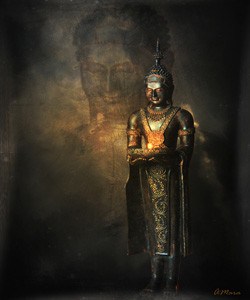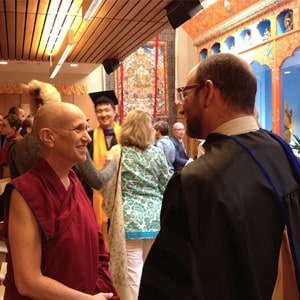The four noble truths

This talk was given at MABA on March 10, 2002.
I want to talk a little bit about the four noble truths, which are the basic foundation of all the Buddha’s teachings. If we understand the four noble truths, then when we listen to any Dharma talk, we’ll know how its topic fits into the general Buddhist framework. The four noble truths was the first teaching the Buddha gave after his enlightenment. This is a very practical teaching that applies to our daily lives. I’ll mention the four and go back and explain each.
First, our present situation—life in cyclic existence—is unsatisfactory. Second, our unsatisfactory experiences has causes; there is an origin to them. Third, there is a state free from those unsatisfactory situations, i.e. nirvana or true cessation. And fourth, a path exists to get there.
It is interesting that when the Buddha began teaching, he started off talking about the unsatisfactoriness of our present condition. We all know that we have problems in our lives. We know that not everything in our lives is wonderful and that things are unsatisfactory. So we may wonder, “How come I have to go to a Dharma talk and hear about suffering?”
There are a lot of people, especially Westerners, who want to hear about light and love. They want to say, “Don’t tell me about suffering, about pain. Don’t tell me about the unsatisfactory nature of cyclic existence. I just want to hear about love, light, and bliss, something fantastic and extraordinary.”
But the Buddha was practical. He said, “Ok. We are going to look into our lives.” Practicing Dharma isn’t about having an escapist mentality. It isn’t about getting into some spaced-out state or having some peak experience we can tell our friends about. Real spiritual practice means understanding ourselves, understanding the situation we are in, and understanding our potential and how we can remedy our difficulties.
In outlining the four noble truths, the Buddha spoke about our present situation and our potential. The first two noble truths—[1] unsatisfactory conditions and [2] their causes—deal with our present state. In the last two noble truths—[3] the cessation of those unsatisfactory conditions and [4] the path to that cessation—talk about our great human potential.
Most of us live on automatic, without thinking a lot about the causes and results of our actions. In order to use our potential, we have to deeply understand that living on automatic is really unsatisfactory and keeps us enslaved in cycles of problems and suffering. For example, do we ever ask ourselves, “Why do I go to work? Why do I eat? Why did I get married or did not get married? Why do I go out with friends? Why did you buy a new car?” Do we really stop and think about those things? Even after we do them, do we ever ask ourselves, “Am I happy? Is what I’m doing really fulfilling and meaningful? When I arrive at the time of death, will I look back at my life and be happy about what I did, or will I have regrets?”
We often space out and don’t investigate those questions. Instead, we have a car. We have a new VCR. We have this, we have that. So we think everything is totally wonderful in our life. Right? No! So, why are we doing these things? Because we are supposed to. Because everybody else does. Because they say if I do it, I’ll be happy. But my experience is that I’m not.
So we need to look at how unsatisfactory living a life on automatic is. If we don’t look closely at that, what will happen is that we’ll live our entire life on automatic doing exactly what we are supposed to do and we’ll get to the end of our lives and looking back, we’ll think, “What have I accomplished? What was the meaning of my life?” Who wants to get to the end of their life and say the meaning of her life was a lot of stocks and bonds or the meaning of his life was a bunch of titles and awards? Is that all our life is worth? I don’t think so.
The teaching on unsatisfactoriness is to help us to wake up. Let’s look at our basic experience, we all want to be happy, right? Does anybody prefer to be unhappy? No. Does anybody get everything they want? No. Think about it: when you have kids, one of the first and important things you teach them is that we can’t always get what we want. That’s throughout our whole lives, isn’t it? We never succeed in getting everything we want.
Sometimes we get what we want, and we’re still unhappy. We’re disappointed. It wasn’t as good as it’s supposed to be. Let’s say we save up to go on a marvelous holiday to Hawaii. It’s winter in St. Louis, we go to Hawaii. That’s supposed to be wonderful, isn’t it? To bring us happiness. But we get there and it’s raining. Our marvelous vacation is not as good as we thought it was going to be.
In addition, problems, which we don’t want, come anyway. We try very hard not to have them but they come automatically. We don’t have to pay anything for them. We don’t have to reserve them. They just come.
So here we are, wanting to be happy, but being frustrated: we can’t get all we want, when good things happen they often aren’t as good as we thought they’d be, and we get what we don’t want. And as if we didn’t have enough problems, all this happens in the context of getting born, aging, falling sick, and dying. Yuck!
When we think about it, we already did the “getting born” part for this life. But getting old continues. The moment we’re born, we begin the process of aging. Is aging fun? No, not particularly. We all like to be young. But we all are getting older. Our society idolizes youth, but none of us are getting younger. In addition, we get sick. That’s not fun either. And the one for sure thing in our life is that we are going to die.
We have calendars full of events we have to do. On Monday I have so many things to do. Actually the only thing we have to do is die. Everything else is a maybe. When we don’t think about our mortality, we could think we might find some pleasure, some happiness. But given the fact that our happiness doesn’t last long and occurs amidst birth, aging, sickness and death, any pleasure and success we have is not going to be ultimate.
It’s understanding this situation, understanding these things that cures us. Understanding this, we choose to stop running around, searching for pleasure. We begin to see that grasping for pleasure is the source of our dissatisfaction and frustration. We realize that happiness will never come from living on automatic, selfishly seeking pleasure here and there.
Why did the Buddha teach about the unsatisfactory nature of cyclic existence? He didn’t do it so that we’ll feel depressed. We can get depressed all by ourselves; we don’t need to listen to teachings on how to do that! The Buddha taught about the unsatisfactory circumstances so that we would wake up and ask ourselves, “What really is the happiness that we all say we want? What causes it? What causes our pain and how can we stop those causes?” These questions set us off on a spiritual journey that ultimately will lead us to happiness. This journey makes our life meaningful.
Venerable Thubten Chodron
Venerable Chodron emphasizes the practical application of Buddha’s teachings in our daily lives and is especially skilled at explaining them in ways easily understood and practiced by Westerners. She is well known for her warm, humorous, and lucid teachings. She was ordained as a Buddhist nun in 1977 by Kyabje Ling Rinpoche in Dharamsala, India, and in 1986 she received bhikshuni (full) ordination in Taiwan. Read her full bio.


